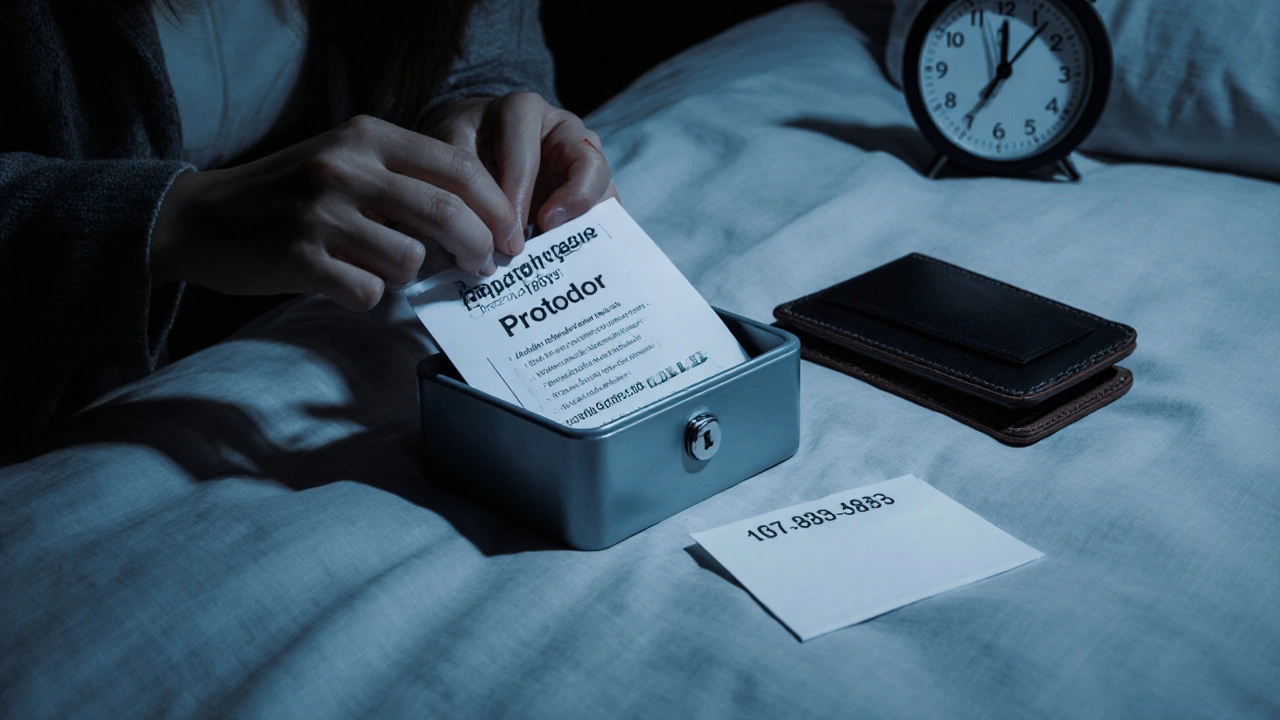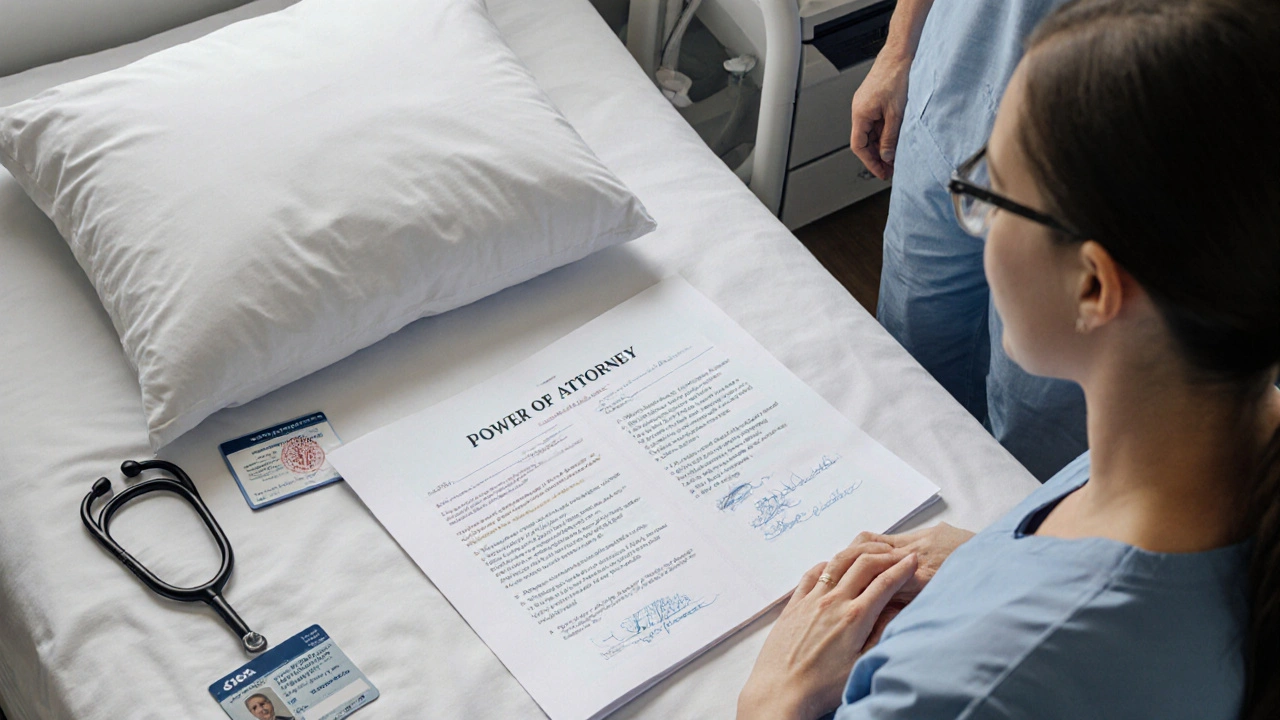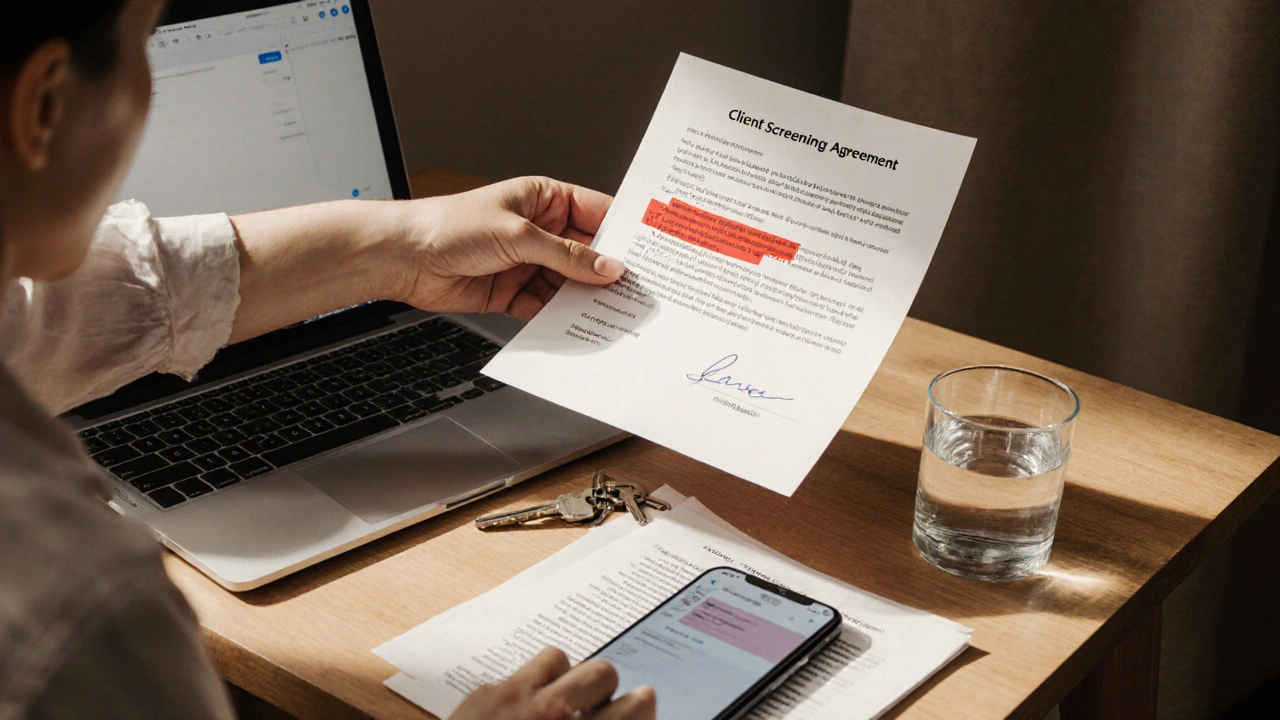Sex work is legal in some places and criminalized in others, but no matter the law, safety never takes a day off. Many sex workers face risks every day - from violent clients to police harassment, from payment disputes to being cut off from emergency services. The good news? You don’t have to wait for the system to change to protect yourself. There are real, enforceable legal documents you can prepare now that give you power, clarity, and protection - even in places where your work is technically illegal.
Client Screening Agreement
This isn’t just a list of red flags. It’s a written contract you hand to a client before any service begins. It includes your boundaries, payment terms, and safety rules. For example: "No drugs on premises," "No unprotected sex," "Payment in full before service," and "No recording without written consent."
Why does this matter? In 2023, a sex worker in Melbourne used a signed screening agreement to prove in court that a client had violated agreed-upon terms when he attacked her. The document helped the judge understand this wasn’t a random incident - it was a breach of a clear, mutual understanding. Courts don’t always side with sex workers, but they do side with evidence.
Keep a copy for yourself. Send a digital version via encrypted messaging. Print one and keep it with your keys. Make sure the client signs it - even a simple "I agree" with their name and date is enough. If they refuse to sign, walk away. That’s not a loss. That’s a saved life.
Emergency Contact Protocol
Most sex workers already have a safety buddy. But a buddy who doesn’t know what to do when things go wrong is just a person with a phone. Your Emergency Contact Protocol is a one-page document that tells your trusted person exactly what to do if you don’t check in.
Include:
- Your full name and alias
- Exact address or meeting location for the appointment
- Time you’re expected to check in
- What to do if you’re late: call police, send this document to a lawyer, notify your support network
- Who to contact if you’re arrested or detained (legal aid orgs, advocacy groups)
- Your preferred hospital and doctor’s name
Give this to your safety buddy. Update it every time you change your routine. Keep a printed copy in your bag. Some workers in Sydney have used this document to get police to take their reports seriously - because it showed they had a plan, not just fear.
Financial Agreement and Payment Receipt
Payment disputes are one of the most common reasons sex workers are threatened or assaulted. A client might say, "I didn’t agree to that," or "I’ll pay tomorrow," and then disappear. Or worse - they might accuse you of stealing.
Create a simple payment receipt. It doesn’t need to be fancy. Just write:
- Date and time
- Service provided
- Amount paid
- Method of payment (cash, crypto, bank transfer)
- Client’s full name and contact info (if safe to collect)
- Your signature
Have the client sign it too. Even if they’re annoyed, most will sign if you say, "It’s just for my records - my accountant needs it." In 2024, a worker in Brisbane recovered $1,200 from a client who denied paying after she produced a signed receipt. The court accepted it as proof of transaction.
If you take digital payments, use apps that provide receipts with timestamps. Never rely on screenshots. Always have a paper trail.

Consent and Boundaries Document
Consent isn’t just a verbal "yes." It’s ongoing, specific, and revocable. A written Consent and Boundaries Document helps you avoid confusion, escalation, and manipulation.
Use this document to list:
- Services you offer (and those you don’t)
- Physical limits (no choking, no anal, no needles, etc.)
- Verbal boundaries (no yelling, no name-calling, no demands after payment)
- Technology rules (no recording, no photos, no social media tagging)
- What happens if boundaries are crossed (service ends immediately, no refund, police called)
Hand this to the client before you start. Tell them, "This is what I need to feel safe. If you’re okay with it, sign here." Many clients respect this - not because they’re saints, but because they know you’re serious. And if they’re not okay with it? You just filtered out someone dangerous.
This document also protects you if you’re ever accused of coercion. It proves you set clear rules - and the client agreed.
Legal Power of Attorney for Medical Decisions
If you’re ever hospitalized and unable to speak - whether from violence, overdose, or illness - who speaks for you? Hospitals often call family, even if family is abusive, disapproving, or absent.
In Australia, you can legally appoint someone as your Medical Power of Attorney. This person gets the right to make decisions about your care, release your medical records, and speak to doctors - even if you’re unconscious.
Choose someone you trust completely: a friend, a coworker, a community advocate. Fill out the form from your state’s health department. Get it witnessed and notarized. Keep a copy with your ID, and give one to your power of attorney.
One sex worker in Perth did this after a client choked her into unconsciousness. When she woke up in hospital, the staff were about to release her to her estranged mother. But because she had a signed Power of Attorney, her chosen advocate was allowed to step in. She got proper care. No one pressured her to drop charges. That document saved her dignity.

How to Store and Secure These Documents
These papers mean nothing if they’re lost, stolen, or destroyed. Here’s how to keep them safe:
- Use encrypted cloud storage (like ProtonDrive or Tresorit) - not Google Drive or iCloud
- Save printed copies in a lockbox or hidden safe
- Give trusted people digital access - not everyone, just one or two
- Update documents every 3 months
- Never store them on your phone with unencrypted notes apps
Some workers in Adelaide use a simple trick: they email each document to themselves with a subject line like "Routine Health Check - DO NOT OPEN". If something happens, their safety buddy knows to open it.
What These Documents Won’t Do
These papers won’t stop every bad person. They won’t make your work legal overnight. They won’t replace a strong community or a good lawyer. But they do something powerful: they shift the balance of power.
Before, you were just a person trying to survive. Now, you’re someone who has planned, documented, and prepared. You’re not asking for permission to be safe. You’re asserting your right to be.
Every time you use one of these documents, you’re not just protecting yourself. You’re building a new standard. You’re showing others it’s possible. And slowly, that changes the system.
Where to Get Help Filling These Out
You don’t need a lawyer to create these. But you do need reliable templates. Here are trusted, free resources:
- SWOP Australia - offers downloadable safety templates in multiple formats
- Red Umbrella Fund - provides legal toolkits for sex workers globally
- NSW Sex Workers Outreach Program - has printable PDFs for consent and emergency plans
- Global Network of Sex Work Projects (NSWP) - guides on legal rights and documentation
Don’t wait until you’re in crisis to find these. Bookmark them now. Print them. Keep them in your pocket.
You deserve safety. You deserve control. You deserve to set the rules - not just follow them.
Are these documents legally binding if sex work is illegal in my area?
Yes, many parts of these documents are still legally useful even if your work is criminalized. A signed payment receipt proves a transaction occurred - which can help if you’re accused of theft or fraud. A consent document shows you didn’t agree to violence - which can help in assault cases. Emergency protocols help police and hospitals understand your situation. Courts look at evidence, not legality of your job. These documents give you evidence.
Can I use these documents if I work online or from home?
Absolutely. Online workers face the same risks - blackmail, non-payment, doxxing, threats. A Consent and Boundaries Document can include rules like "No screenshots," "No recording," and "No contact after payment." A Financial Agreement can be sent via encrypted message with a digital signature. Your safety doesn’t change because your workplace is digital.
What if a client refuses to sign anything?
That’s your red flag. A client who refuses to sign a simple agreement is either trying to manipulate you or doesn’t respect your boundaries. Walk away. You don’t need their money more than you need your safety. The right clients will understand. The wrong ones will find someone else.
Do I need a lawyer to create these documents?
No. These are not complex legal contracts. They’re practical safety tools. You can create them yourself using free templates from sex worker advocacy groups. A lawyer isn’t needed unless you’re dealing with a serious legal case - and even then, many orgs offer free legal support to sex workers.
How often should I update these documents?
Update them every three months, or anytime your routine changes - new location, new payment method, new safety buddy. Your safety plan should grow with your experience. Outdated documents can be misleading. Keep them current so they actually work when you need them.
Can I use these documents if I’m undocumented or a migrant worker?
Yes. These documents are about your personal safety, not your immigration status. In fact, they’re even more critical for undocumented workers. A Medical Power of Attorney ensures someone you trust can speak for you in hospital. A Consent Document protects you from exploitation. You don’t need papers to be safe - you just need to be prepared.
